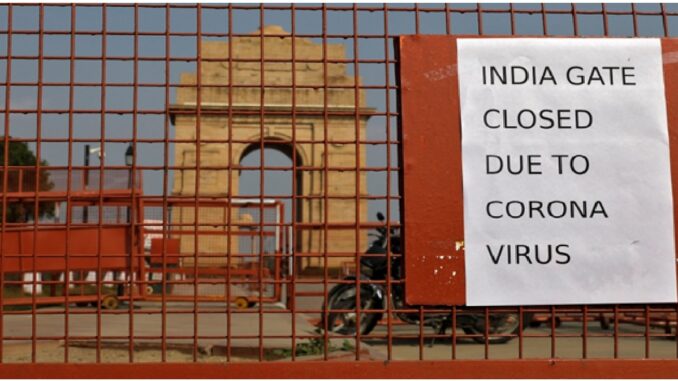
The spread of the novel coronavirus disease (COVID-19) over the past few months has adversely affected everyone across the world. The World Health Organization (WHO) has classified the COVID-19 as a pandemic.
Origin and Nature of Coronavirus
- People infected with coronavirus were first detected in Chinese city Wuhan’s Seafood Wholesale Market.
- WHO named the virus COVID-19 and declared it a ‘pandemic’.Its technical name is Severe Acute Respiratory Syndrome Coronavirus2 (SARS-CoV-2).
- Coronaviruses are a group of viruses causing common cold to fatal diseases, such as, Middle East Respiratory Syndrome (MERS-CoV) and Severe Acute Respiratory Syndrome (SARS-CoV).
- These are transmitted from animals to humans, therefore, considered zoonotic. For example, SARS-CoV was transmitted in humans from civet cats.Covid-19’s ability for continuous mutation allows it to jump to humans.
- Covid-19 is transmitted among humans mainly through respiratory droplets.
- The incubation period of Covid-19 is usually 14 days.
- To test Covid-19 positive people, Polymerase Chain Reaction Test is done which detects the genetic material of the virus, that is, RNA in the human sample.
- Hydroxychloroquine has been touted as a
possible remedy to COVID-19, but medical experts are still divided over its
efficacy.
- It is similar to the anti-malarial drug chloroquine.
- Used in treating auto-immune diseases like rheumatoid arthritis.
- India is one of the biggest manufacturers of this drug.
International Response
- COVID-19 Solidarity Response Fund has been announced by WHO to mobilize various businesses, institutions and private individuals against the pandemic.
- COVID Action Platform, created byWorld Economic Forum along with WHO, aimsto provide a platform for a collective action against the pandemic by the business community all over the world.
- Emergency Fundhas been created under SAARC to respond to the pandemic within South Asia. Contributions to the fund are voluntary.
- UN General-Secretary launched the COVID-19 Global Humanitarian Response Plan.
- Coalition for Epidemic Preparedness Innovations (CEPI), launched by WEF in 2017, is bringing together sections of academia, civil society, business and government leaders to develop a vaccine against Covid-19.
- Resolution named ‘Global solidarity to fight the coronavirus disease 2019 (COVID-19)’ has been unanimously adopted by UN General Assembly which outlines the problem of racism and xenophobia in the fight against the pandemic.
- UN Security Council held a virtual closed session to discuss the Covid-19 pandemic.
Indian Government’s Response
- Epidemic Diseases Act, 1897 has been invoked.
- National Disaster Management Act has been invoked to bring states under direct control of Centre to ensure coordination.
- India’s experience in dealing with Ebola in 2014 and Nipah in 2018 has been applied in taking quick quarantine and surveillance measures.
- Indian government has identified certain ‘hotspots’ which are to be sealed to prevent further spread of the pandemic. The criterion for a hotspot is still subject to change as it is based on the continuous data inputs on the spread of virus. Even a single case in an area is enough to consider it a hotspot if it poses the risk of a wider spread.
- Indian government has launched AarogyaSetu Mobile App, developed by the Ministry of Electronics and IT, to identify those infected by Covid-19 through self-testing and contact tracing using Bluetooth and GPS.
- Ministry of Tourism has launched a portal ‘Stranded in India’ to assist tourists.
- To check misinformation/fake news, a Fact Check Unit has been set up in the Press Information Bureau.
- To counter the shortage of testing kits, the National Institute of Virology, which falls under the Indian Council on Medical Research has approved Covid-19 testing kits manufactured by domestic private firms.
- There is still no news of community transmission
in India, which is when the source of infection is unknown. Following are the 4
stages of pandemic spread-
- Stage 1 – First appearance of the disease
- Stage 2 – Local transmission
- Stage 3 – Community transmission
- Stage 4 – Widespread outbreak. E.g. US and Italy
Economic Impact of the Pandemic
- Due to the shutdown of industries in China and other manufacturing hubs, there has been a disruption of supply chains which has resulted in the scarcity of finished and intermediate good. In case of India, its dependence on China for approximately 85% of active pharmaceutical ingredients (APIs) has exposed its pharmaceutical sector to price volatility.
- US companies severely affected by the shortage of intermediate goods may cut down on their dependence on China, thus further intensifying the trade war.
- Banking sector has come under intense pressure for the expected default on loans in huge numbers, not just by private individuals but also industries. Consequently, the bad loan crisis is going to get worse in the Indian banks, to which RBI has responded by pumping more liquidity in the system.
- Internationally, the possibility of insolvency and default has triggered capital flight in emerging economies and a sharp drop in global FDI.
- IMF has declared global recession comparable to the 2009 financial crisis.
- With oil consumption by manufacturing industries and vehicles going down, oil prices and demand has dropped.
- Airlines and tourism industry are the obvious victims of lockdowns all over the world.
- Massive unemployment has been unleashed by the lockdowns, especially amongst the migrant workers in the informal sector. Indian government has responded through cash transfer using JhanDhan accounts.
Conclusion
- International response to the Covid-19 pandemic has been relatively efficient and transparent compared to the SARS outbreak, nonetheless, mistakes have been committed in the delayed announcement of the Public Health Emergency of International Concern by WHO and delayed imposition of international travel restrictions.
- UN Security Council has also failed to take definitive decisions because of the geo-political rivalry between US and China. Moreover, withdrawal of funding from WHO by US has further aggravated the crisis.

Leave a Reply
You must be logged in to post a comment.